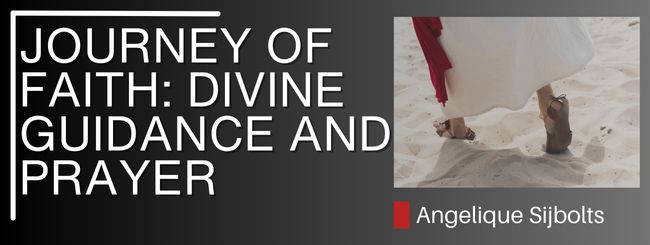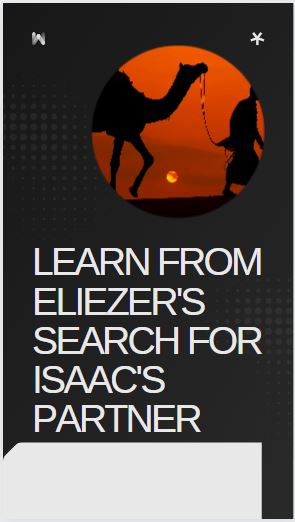בס”ד
Journey of Faith: Divine Guidance and Prayer in the Tale of Eliezer and Rivka
Parshat Chayei Sarah 5784 (additional)
Introduction
In the biblical narrative of “The Engagement of Rivka” in Parsha Chayei Sarah, the quest for a suitable bride for Isaac unfolds, revealing profound lessons in faith, commitment, and divine guidance. As we delve into this story, we encounter the unwavering trust of Abraham, the dedication of his servant Eliezer, and the exemplary kindness of Rebecca.
The Search for Isaac’s Bride
Abraham tasked his senior servant, Eliezer, with the responsibility of finding a wife for his son Isaac, specifying that she should come from Abraham’s homeland rather than from the Canaanites. Concerned about the potential refusal of the chosen woman, the servant sought reassurance from Abraham. Abraham, confident in Divine intervention, assured the servant that G-d would help him achieve success in the mission. Taking the task seriously, the servant swore an oath, at Abraham’s request, to fulfill the assignment.
With Abraham’s special blessings and gifts, Eliezer embarked on the journey with ten camels to Nahor in Aram-naharaim. In the narrative, the focus shifts to the “camel test”, a crucial aspect of finding the right woman for Isaac.
Eliezer and his men, searching for a suitable bride for Isaac, arrived at a well. Among the potential candidates, Rivka, the daughter of Bethuel, stood out for her nobility. When Eliezer requested water, Rivka graciously allowed him to sip from her jug. However, she tactfully moved the jug from her shoulder to her hand, maintaining a modest distance. Recognizing the cultural sensitivity, Rebecca poured the water into the trough for the camels, going beyond expectations by generously providing water for all the camels without expecting anything in return. Her actions exemplified devotion, modesty, sensitivity, responsibility, kindness, and generosity.
Rabbi Avraham Ibn Ezra taught that Divine input guides all marriages on earth.
He explains this from the word הארץ (from verse 3) This is what is meant by the Talmud in Sotah 2 that 40 days before the gestation of the fetus a heavenly voice decrees: “The daughter of so-and-so will be married to so-and-so.” These predictions apply even if the parties involved live on opposite sides of the ocean.
This raises the question of whether Abraham was aware of Rivka’s existence, and if so, why doesn’t he simply instruct Eliezer to pick up Rivka, but emphasize that Eliezer should not be mentioned here name in the foreign land to find here?
Some suggest that Abraham sent Eliezer to his family’s house because he knew Isaac’s future partner was born, but he didn’t yet know her name, considering Bethuel had multiple daughters. Another perspective suggests that Abraham knew it was Rivka but couldn’t disclose this information to Eliezer. According to the Or HaChaim[1], there was a suspicion that Bethuel and his family might try to interfere with the prospective match. Abraham relied on Divine intervention, believing that G-d would handle Betuel and ensure the success of the match. When Abraham had revealed the name of Rivka to Eliezer, Eliezer would not have prayed to G-d to find a partner for Isaac but would have gone directly to Betuel to ask for her hand. Eliezer had to place his trust entirely in G-d, hoping to find the right girl.
This explanation aligns with Betuel’s ambiguous response in Genesis 24:50, suggesting that they couldn’t refuse the match because it was evident that the matter had emanated from the L-rd.
From the above story, we can draw several valuable lessons and insights:
Belief in Divine Guidance: The story emphasizes the importance of trusting in G-d’s guidance in significant decisions, such as finding a life partner. Both Abraham and Eliezer demonstrated confidence in G-d leading the way.
Trust in Difficult Situations: Abraham trusted in G-d, even in uncertain situations, such as the potential resistance from Bethuel against the intended match. This teaches us to have faith in times of uncertainty and to maintain belief even when circumstances seem challenging.
Obedience to Divine instructions: Abraham sent Eliezer to his family, even if he possibly knew the identity of the intended partner. This illustrates obedience to divine instructions, even when not fully understood, with the belief that G-d sees the bigger picture.
Patience and Trust in the Process: The fact that Abraham might not have disclosed Rivka’s name suggests the importance of patience and trust in the process of finding a life partner. Sometimes, we need to rely on G-d’s timing and guidance.
Commitment to Tasks: Eliezer, Abraham’s servant, demonstrated commitment to his task by earnestly seeking Divine guidance and taking an oath to fulfill the assignment. This illustrates the importance of dedication and integrity in carrying out responsibilities.
Humility and Care: Rebecca’s actions at the well showcase humility and care. Going above and beyond, she exhibits kindness and generosity without expecting anything in return. This underscores the significance of kindness and service to others.
Cultural Sensitivity: Rebecca displays cultural sensitivity by not using the water after Eliezer has drunk from it. She acts tactfully, avoiding potential offenses. This highlights the importance of understanding and respecting different cultural norms.
Divine Providence in Relationships: According to Rabbi Avraham Ibn Ezra and the Talmud, the story reflects the concept of Divine providence in marriages. This reminds us that some things are beyond our control, and there may be a higher plan for significant life events.
The Importance of Prayer: Eliezer prayed to G-d for guidance, emphasizing the significance of prayer when taking important steps in life, including finding a life partner.
Conclusion
The story provides a rich source of moral and spiritual lessons that can be relevant to our daily lives.
By Angelique Sijbolts
Notes:
[1] Or HaChaim 24:12 There was a suspicion that Betuel (and family) would try to foil the prospective match. So maybe we could say that Avraham decided, that if he would go about the match regularly (by telling Eliezer: ‘go get Rivkah’) – Betuel would foil the match and Eliezer would fail in his mission. So instead he relied on Hashem – ie that Hashem would sort Betuel out [which is what happened in the end] and somehow make the match, which could only properly be done without revealing the girl’s identity to Eliezer.
This explanation seems to fit in with Betuel’s reaction after hearing Eliezer’s story (Genesis 24:50): And Laban and Bethuel answered and said, “The matter has emanated from the Lord. We cannot speak to you either bad or good.
Rashi:
We cannot speak to you: to refuse in this matter, either with an unfavorable reply or with an appropriate reply, because it is obvious that the matter has emanated from the Lord, according to your words, that He designated her for you.
…. which seems to imply that if the matter hadn’t come from Hashem – then they would have naturally refused the match – either unfavorably or appropriately – a refusal nonetheless.
Sources:
I used the following sources to come to the answer on the question given to me:
mi yodeya: Why didn’t Avraham tell Eliezer to go get Rivka?
Chabad Article: Rebecca and the Camel Test A Lesson in Giving, by Esther Vilenkin
With thanks to Rabbi W. van Dijk for his inspiring question
© Copyright, all rights reserved. If you enjoyed this article, we encourage you to distribute it further.
Our blogs may contain texts/ quotes or references of
Mechon-Mamre.org, Aish.com, Sefaria.org or AskNoah.org
that contain copyrights and which we may use with there permission.

